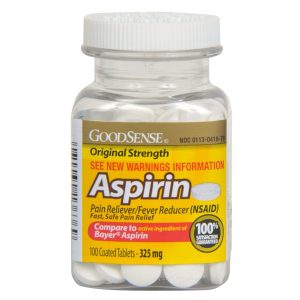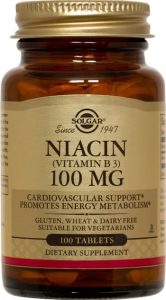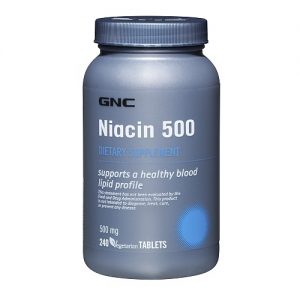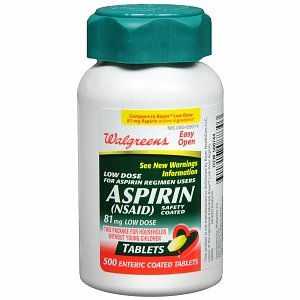Contents
Is Aspirin NSAID?
Aspirin is an analgesic, non-steroidal anti-inflammatory drug which is used widely for the treatment of fever, inflammation and mild to moderate pain.
Aspirin also plays a key role in the treatment of inflammatory diseases such as rheumatoid arthritis (a progressive autoimmune disease primarily causes inflammation in joints), osteoarthritis (a disease of joint caused by breakdown of joint cartilage) and to reduce the risk of heart attack and deaths caused by heart attack.
Aspirin is usually recommended for the patients of ischemic stroke (blockage of blood flow to brain due to blood clot) or mini stroke (blockage of blood flow to brain for short time).
This drug is also used to treat the angina (sensation of chest pain occur when heart muscle does not get enough oxygen). The drug is available under generic name Acetylsalicylic acid (ASA) and brand name Aspirin.
The active component of the drug aspirin is salicylic acid, which was initially isolated by Edward Stone from the bark of willow tree in 1763. The drug was first chemically synthesized by Felix Hoffmann at Bayer in 1897.
Aspirin is available as acetylsalicylic acid, which is a synthetic pharmaceutical aromatic homomonocyclic compound with a molecular formula C9H8O4.
The drug Aspirin is chemically known as 2-(acetyloxy) benzoic acid. It is available in the form of regular strength tablets and caplets, extra strength tablet, delayed-release tablet and quick chewable tablets for oral administration with food or without food.

What is Niacin?
Niacin is a water-soluble vitamin that belongs to the vitamin B family and occurs in many animal and plant tissues, with antihyperlipidemic activity.
The drug is available under generic names such as niacin, nicotinic acid, vitamin B3 and brand names Niacor, Niaspan, Slo-Niacin, Nicolar (discontinued).
Niacin, also known as nicotinic acid is a synthetic pharmaceutical organic compound with molecular formula C6H5NO2. The drug is supplied as tablets or capsules for oral administration by mouth.
The tablets are available in varying strength of 250, 500, 750, and 1000 mg whereas capsules in strength of 250 and 500 mg. It is available in different forms such as immediate release, extended or sustained release and no-flush Niacin. Niacin is an antihyperlipidemic agent that is primarily used to reduce the levels of cholesterol and triglyceride in the blood stream.
It is recommended for treatment of pellagra (arising due to Niacin deficiency). Niacin is also used for lowering the risk of osteoarthritis, Alzheimer’s disease, cataracts, and type 1 diabetes.
It is also implicated for treatment of schizophrenia, depression, hallucinations, and memory loss, migraines, chronic brain syndrome, motion sickness, alcohol dependence, and edema.
It is also recommended for treating acne, leprosy, attention deficit-hyperactivity disorder (ADHD), improving digestion, lowering blood pressure, improving circulation in some cases.
Niacin is indicated in lowering the risk of recurrent myocardial infarction in case of patients with a history of myocardial infarction and hyperlipidemia.
Besides, Niacin in combination therapy with a bile acid binding resin in patients with a history of coronary artery disease (CAD) and hyperlipidemia is recommended to treat atherosclerotic disease. Niacin is also prescribed as adjunctive therapy for treatment of severe hypertriglyceridemia.

How Aspirin and Niacin works?
Aspirin is a non-steroidal anti-inflammatory drug that inhibits cyclooxygenase (COX) enzyme therefore known as COX inhibitor agent. The action of both acetyl and salicylate component of the acetylsalicylic acid (ASA or Aspirin) and its active metabolite salicylate are liable for the anti-inflammatory and analgesic properties through inhibition of cyclooxygenases.
ASA inhibits the COX (both COX-1 and COX-2) activity by binding to it irreversibly. Inhibition of COX results in reduced formation of precursors of prostaglandins and thromboxane from arachidonic acid.
Antipyretic effect of ASA results from the intervention in production of Prostaglandin E1 which is a potent pyretic agent. ASA also inhibits the aggregation of platelets.
This inhibitory effect of ASA is resulted from the intervention in production of Thromboxane A2 which is accountable for the platelets aggregation.
Niacin is a precursor molecule to cofactors such as nicotinamide adenine dinucleotide (NAD) and nicotinamide adenine dinucleotide phosphate (NADP) and also binds to a number of receptors including Nicotinic acid phosphoribosyltransferase, Nicotinate D-ribonucleotide phyrophsopate phosphoribosyltransferase, Niacin and the Nicotinate N-methyltransferase receptor.
However, the exact mechanism exerted by Niacin for altering lipid profiles is not well defined, but may involve many actions. These include lowering of hepatic triglycerides esterification, partial inhibition of release of free fatty acids from adipose tissue, and increase in the activity of enzyme lipoprotein lipase that may be responsible for increasing the rate of chylomicron triglyceride removal from plasma.
Besides, Niacin also causes a decrease in the levels of apolipoprotein B-100 (apo B) which is the major component of the VLDL (very low-density lipoprotein) and LDL fractions and thus a decrease in their synthesis. Niacin does not exert any effect on fecal excretion of fats, sterols, or bile acids.


Can both Aspirin and Niacin be taken together in combination?
Aspirin Low Strength and niacin Drug Interactions: Yes, both the drugs can be taken together in combination. Clinical studies indicate the safety and efficacy of using the combination of the drugs in reducing the severity and incidence of Niacin extended-release (NER) induced flushing.
Although associated with cardiovascular benefits, Niacin mainly causes adverse effects such as vasomotor side effects and increase in liver enzymes (flushing and hepatotoxicity).
This can be minimized with either small doses of Niacin or co-administration with Aspirin. It is generally recommended to take Aspirin 30 minutes prior to Niacin administration so as to inhibit COX1-dependent prostaglandin production in the skin that causes Niacin-induced flushing.
Data demonstrates that higher doses of Aspirin shows greater efficacy in decreasing intolerability to Niacin in contrast to lower doses (80 or 160 mg compared to 325 mg).
No combined formulation exists at present for Aspirin and Niacin, patents are being filed to develop fixed-dose combination product of sustained-release Aspirin (to maintain Aspirin at sufficient levels) and delayed and extended-release Niacin in order to increase patient compliance.
The combination of Aspirin and Niacin is usually very beneficial to minimize the risk of developing heart disease in patients with high cholesterol and showing a decreased response to Aspirin for the treatment of clogged arteries than patients with normal cholesterol levels.
Besides, clinical studies in healthy people and people with inflammation of the stomach caused by Helicobacter pylori infection (a bacterium causing ulcers) demonstrates the protective effect of Niacin/vitamin C on Aspirin side effects.
Safety and precautions while taking Aspirin: Niacin combination
- Aspirin and Niacin may interact with other drugs. Therefore, care should be taken when you are taking any prescription or non-prescription medicines and herbal or vitamin supplements. It is advisable that you do not start, stop or change or take any medicine unless you have discussed with your doctor or professional consult.
- Do not use the medicine if you are hypersensitive or allergic (e.g., anaphylaxis) to Aspirin or Niacin or any of the constituents.
- Aspirin is generally not recommended to be taken in case of pregnancy and breastfeeding while only recommended amounts of Niacin should be taken during pregnancy which is 30 mg per day for women under 18 years of age, and 35 mg for women over 18.
- Administration of the drugs (Aspirin and Niacin) is usually not recommended with alcohol because alcohol increases the level of acetylsalicylic acid about 50-100% in serum in case of Aspirin and causes worsening of flushing and itching in case of Niacin.
- Do not share the medications with other persons having the similar kind of problems. Consult your doctor for more details.
- Dosage adjustment of Aspirin is necessary during development of liver function abnormalities and Niacin is usually not recommended as it might increase liver damage.
“Does Coumadin Interact with Tylenol?“
“Is it alright to take Ibuprofen while taking blood thinners?“
